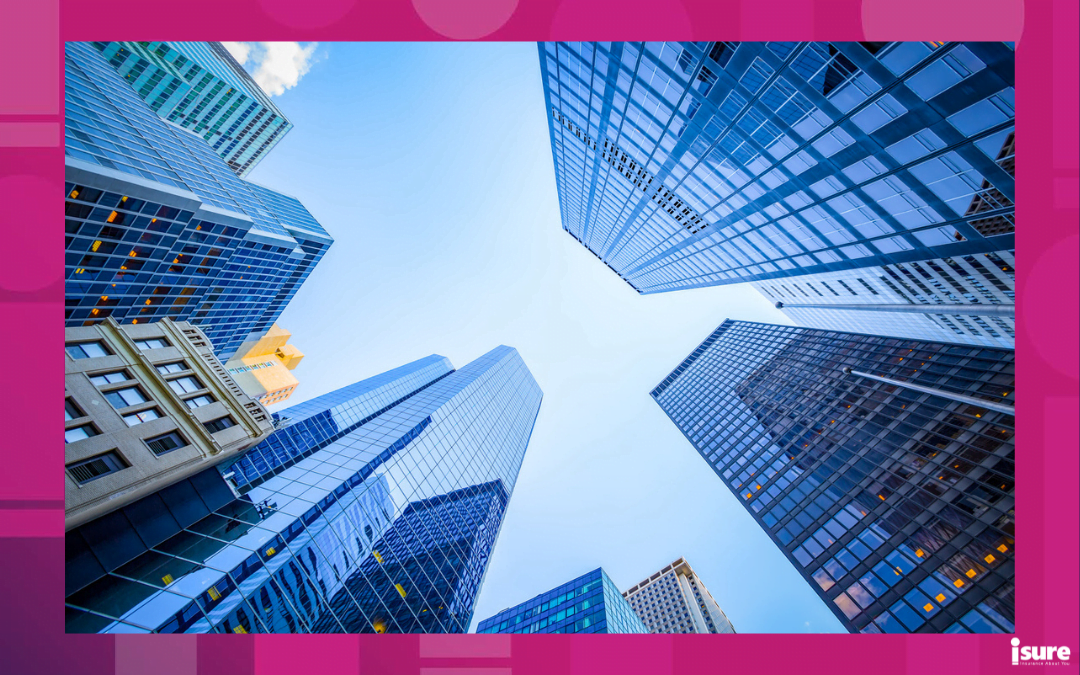Your business is more than just bricks and mortar. Whether you operate a mid-size or large-scale company, the building that you own or lease needs protection against loss, damage and theft. Commercial Building insurance protects you against losses and damages, whether you own your commercial space, lease an office or work from home. This protection covers the physical assets of your business inside and out. Let’s take a look below:
What is Commercial Property Insurance?
Commercial Property Insurance is also known as Commercial Building insurance or Business Property insurance. Commercial Building insurance provides financial coverage for physical loss or damage to your property. Additionally, it’ll cover its physical contents due to an external disaster, such as a fire, theft, or vandalism.
Who needs Commercial Building Insurance?
You’ll need Commercial Property insurance if you:
- Own or lease a commercial building, equipment, or inventory
- Have an office or commercial space
- Use computers, hardware, or machinery for business purposes
- Utilize portable electronics, such as laptops, tablets, or mobile phones for business purposes
- Conduct business off-site
Taking stock
It is very important for you to take an inventory of your business. Prior to applying for Commercial Building insurance, be sure that you take an inventory of your business. You’ll want to have a clear idea of what property you want to insure, and its overall replacement value. The property you might want to insure can include:
- The building that houses your business
- All office equipment (owned or leased)
- Important company documents
- Manufacturing or processing equipment
- Inventory
- Fence and landscaping
- Signs and satellite dishes
What does it cover?
Commercial Property Insurance typically includes coverage for the following:
- Tenant improvements: Improvements you make to a building as a tenant, which cannot be removed, such as carpeting, lighting, paint.
- Building coverage (structure): Replace or repair damage to a property you own due to unforeseen disasters, such as fire or flood.
- Inventory: Replace or repair your merchandise and inventory, including food items, in case of fire, theft, or damage.
- Equipment/fixtures/furnishings: Replace or repair your equipment, machinery, fixtures, or furnishings that are lost or damaged due to unforeseen events. These can be insured for breakdown or failure.
- Electronics: Replace or repair your electronics that are damaged or stolen inside and outside of your office.
- Property in transit: Protects against any losses while your property is being moved.
- Business Interruption: If your company must shut down for a period due to an unforeseen interruption, this covers loss of income and cost to get your business back up and running.
Add-on to your policy
Protect your Commercial Building policy by adding custom extensions:
Business interruption (BI) insurance: When your commercial property is damaged or destroyed by a loss, such as a fire or water damage, your business operations and income can temporarily be interrupted. Business interruption coverage will compensate you for loss of income, as well as fixed and extra expenses incurred while your commercial property is being replaced or repaired. Additionally, you’ll be covered if your business operations are temporarily interrupted due to an insured loss as per your commercial property insurance policy.
Flood coverage: This type of coverage for your business premises is available in case you experience damage from flood waves, tides, tidal waves, tsunamis and the breaking out or overflow of any body of water (natural or man-made).
Sewer back-up coverage: Protects the area bounded by the bearing walls and foundations of your building in the event of damage caused by the backing up or overflow of water from sewers, sump pumps, septic tanks or drains.
What is the cost of Commercial Building Insurance?
Depending on the type of business that you operate, the cost and amount of insurance you need will vary. When determining the best policy options, the following factors should be taken into consideration:
- Type of property
- Type of business
- Age and condition of property
- Building location
- Previous insurance claims
What is not covered?
Most Commercial Building Insurance does not typically cover:
- Mysterious disappearance: An item where the cause of loss cannot be explained.
- Vacant or unoccupied property: If your building is vacant for more than 30 days, you’ll need Vacant Property insurance.
- Wear and tear: For equipment due to regular use.
- Cash, securities, or precious metals: If you have these items on your premises; you’ll need Crime Insurance.
- Deliberate damage to your property.
A property is considered vacant after 30 days, and it is seen as high-risk. It is more susceptible to property damages, such as vandalism. Your insurer may choose to remove some key coverages from your policy. Please speak to one of our isure brokers to better understand the restrictions around commercial property vacancy.
What is the standard deductible in a Commercial Building policy?
Most Commercial Property Insurance policies include at least one deductible. They help keep the cost of premiums low for both you and your insurer. The three most common deductibles are:
- Flat deductibles (popular): A specific dollar amount applied to each loss.
- Percentage deductibles: Used in catastrophic events to cover a percentage of the policy’s limit or value of the property.
- Waiting periods: Refers to the amount of time before coverage sets in.
How is cost determined?
When determining how much Commercial Building insurance will cost for your business, it is important to take into account the level of risk you carry. The greater the risk, the higher your premiums will be. The cost of your Commercial Property Insurance policy will also depend on the size and nature of your business. A small business can pay as low as $425 a year, while a mid-sized company can pay anything from $1,800 to $10,000. Insurers use a variety of factors to assess and set premiums. These include:
- Location
- Age of your property
- Replacement cost
- Coverage options and limits
- Plumbing, electrical and building upgrades
- Theft and fire security systems
- The type of operation
- Value of asset and equipment
- Your insurance history
Who pays building insurance for a commercial property?
Building insurance on a commercial property is arranged by the property owner. This can be the landlord or an owner-occupier. In the case of a rented property, the landlord might pass off the premiums to the tenant to pay as part of the rental contract.
Does Building Insurance cover employee theft?
No. Employee theft is typically covered under Crime Insurance coverage. Many insurers offer customizable Crime Insurance that can be added to a Commercial Property policy. It can also be a standalone policy for a more specialized coverage. Intact Insurance offers protection for your business against a wide variety of threats, causing unplanned expenses and lost time, including:
- Employee dishonesty
- Theft
- Robbery or burglary
- Fraud
- Expenses resulting from a crime loss
Add Social Engineering Fraud coverage to your policy. This protects your business against loss of money, securities or other property as a direct result of social engineering fraud conducted by a person purporting to be a vendor, client or employee.
What is the difference between Business Liability & Commercial Property insurance?
Commercial property insurance protects your business’s physical assets, including its building, furniture, equipment and inventory from damages caused by:
- Fire
- Hail
- Lightning
- Windstorms
- Vandalism
- Theft
- Explosions
Business Liability insurance helps you address the responsibilities you have to the people who come in contact with your business and its operations. These people include:
- Customers
- Partners
- Suppliers
- Vendors
- Employees
Whether you operate out of a home office, storefront or coffee shop, proper coverage for your assets is imperative. Our isure representatives can provide options for combining property with other business insurance coverages. Let us tailor the commercial building coverage that best suits your business needs! For all your Commercial Insurance needs, contact one of our isure representatives to discuss your coverage options.




